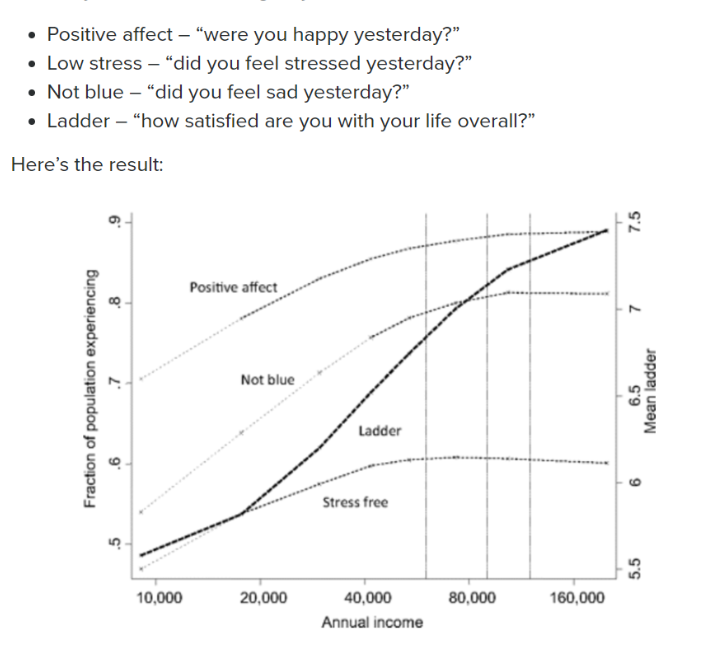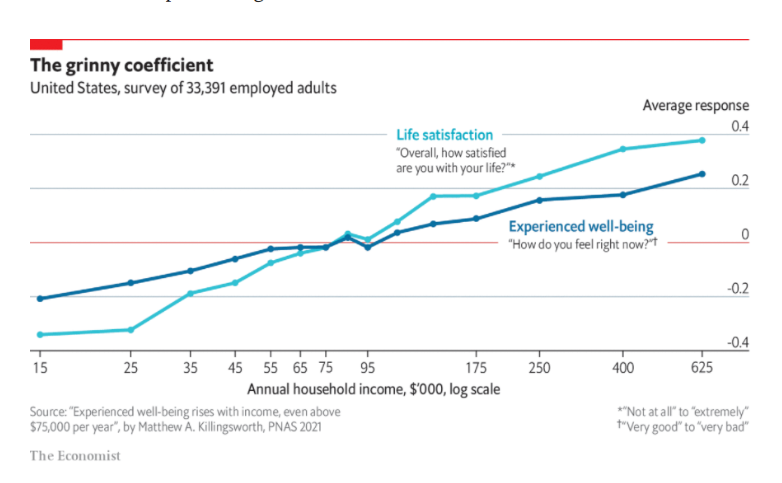Money and Happiness are discussed together in many forums. Is there any correlation between both of these? People have views that money buys happiness, or happiness is absolute and has no correlation with money? This is going to be a never ending discussion.
Research is based on data sets, huge amounts of data sets. A few individuals who are data points of this research may be outliers and may not agree with the overall study (statistical output). This article is based on studies and personal views.
There are two famous studies in this area. The first one was done in 2010 by Daniel Kahneman and Angus Deaton (both Nobel Prize winners in Economics) – “Money doesn’t buy happiness after $75,000”. The focus of the research was to confirm if money played a part in two aspects of people’s emotional lives. Firstly, the everyday quality of daily life, the joy, stress, sadness, anger, and affection that make one’s life pleasant or unpleasant on a day to day basis. And secondly, life evaluation –the thoughts that people have when they think about their lives in general – also called life satisfaction. The study found that money did have an impact on how people evaluate their lives when they think about it; that people with more money feel better about their lives. However, emotional well-being rose with income, as expected too, but only to an annual salary of $75,000 (in that time). Beyond that, people were no happier with higher salaries. The study confirmed that “low income is associated both with low life evaluation and low emotional well-being” but also confirmed that “high income buys life satisfaction but not daily happiness.”. This was an eye-opener for many people.
2010 Research in summary — more money gets you more life satisfaction but daily happiness plateaus after a threshold income level.

The second study of 2021 was by Matthew Killingsworth from Wharton. It brought different aspects. “Money improves well-being, even after $80,000 (this is just a number! Earlier it was 75K) “. He also created a tool for it – Track Your Happiness. This is an iOS application that investigates what makes life worth living. As per Matthew – “We would expect two people earning $25,000 and $50,000, respectively, to have the same difference in well-being as two people earning $100,000 and $200,000, respectively. In other words, proportional differences in income matter the same to everyone and not absolute difference”. That means each additional dollar doesn’t matter the same to everyone. The poorer you are to start with the happier each extra dollar will make you. Utility (from economics) of money is more for you. Second, while more money gives you more control over your life and therefore leads to greater happiness. Chasing money itself as a goal isn’t good for anyone’s psychology as it takes away your control from you. “Although money might be good for happiness, I found that people who equated money and success were less happy than those who didn’t” – Killingsworth notes. “It’s a compelling possibility, the idea that money stops mattering above that point, at least for how people actually feel moment to moment (also called day to day happiness),” he says. “But when I looked across a wide range of income levels, I found that all forms of well-being continued to rise with logarithmic income and not proportionate income. ”
Higher earners are happier, in part, because of an increased sense of control over life, he says. “When you have more money, you have more choices about how to live your life. You can likely see this in the pandemic. People living paycheck to paycheck who lose their job might need to take the first available job to stay afloat, even if it’s one they dislike. People with a financial cushion can wait for one that’s a better fit. Across decisions big and small, having more money gives a person more choices and a greater sense of autonomy. If anything, people probably overemphasize money when they think about how well their life is going. Yes, this is a factor that might matter in a way that we didn’t fully realize before, but it’s just one of many that people can control, and ultimately, it’s not one I’m terribly concerned people are undervaluing.” Rather, he says he hopes this research can help move forward the conversation in an attempt to find what he calls the “equation for human happiness.”

To me what it means is that happiness is a function of many variables e.g. money, autonomy, freedom of choices, resources to make those decisions, doing something you love, getting in a flow state, physical environment, relationships physical & emotional, and many more. As Killingsworth mentioned, that equation for human happiness needs to be developed. Data collection is in process, soon we’ll understand it better by defining correlation. Today most people run behind the success (accomplishments) and/or money to get happiness. There could be more variables in this equation and leveraging those will be much easier to get faster and more day-to-day happiness and overall well-being.
In the end… To me, Money , even increasing income, makes you happier, but % contribution of money in your happiness may not remain same in higher income!
Reference articles:
https://www.inc.com/jessica-stillman/money-happiness-research-matthew-killingsworth-wharton.html
https://hbr.org/2020/09/does-more-money-really-makes-us-more-happy
https://80000hours.org/articles/money-and-happiness/
Leave a Comment
You must be logged in to post a comment.